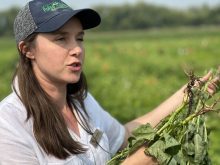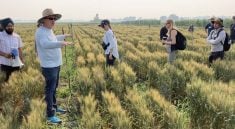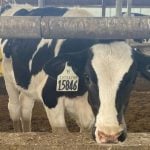“He would have been impressed with the quality of the presentation and the quality of the questions.”
– brian oleson
University of Manitoba students too young to have learned from the late Daryl Kraft as a professor nevertheless felt his influence last week at the inaugural lecture series established in his memory.
“This is something Daryl would have been extremely pleased with,” former colleague Brian Oleson told the 175 people who gathered. “I filled a room with a bunch of people by promising a good discussion on commodity prices.”
Read Also

Farm Credit Canada forecasts higher farm costs for 2026
Canadian farmers should brace for higher costs in 2026, Farm Credit Canada warns, although there’s some bright financial news for cattle
Oleson said Kraft’s ability to insert economic analysis into the big picture was aptly captured by guest lecturer, Alex McCalla, an agricultural economist from University of California, Davis. “He would have been impressed with the quality of the presentation and the quality of the questions.”
The Kraft fund was established by friends, colleagues and the University of Manitoba after he died of cancer in 2003. “His untimely passing spawned a legacy in recognition of his high standards and important contributions to agriculture,” said longtime friend and colleague Bill Toews. Toews couldn’t attend the event, but sent greetings that were read at the reception by his wife Barb.
The Kraft fund has a current capital base of $269,000. If fundraisers can raise an additional $11,821 before March 31, it will receive a $30,000 matching commitment from the university’s department of development.
Student Matthew Hink has also become the first recipient of the undergraduate Kraft prize.
In the first Daryl F. Kraft lecture, McCalla, outlined the complexities in commodity markets and the combination of new influences that make them so unpredictable.
Agricultural commodities have fallen from the highs of last year after tripling between 2007 and 2008, but McCalla noted they continue to be about 30 per cent higher than they were before the boom.
How markets behave in volatile conditions depend largely on how the major producers, the major importers and the major traders are affected by changing conditions. For example, more than 50 per cent of the production from commodities such as coffee, tea and cocoa enter world trade. For wheat it is just under 19 per cent. Those markets will react differently to the same set of triggers.
As well, the markets are linked; what happens with one commodity can have a spillover effect on others. Throw fluctuating currency rates, a surge in speculative interest and climate change into the mix and analysts have a recipe for uncertainty.
“The best we can say about future markets is that there is likely to be greater annual instability with the possibility of increased frequency of spikes,” McCalla said.
It is no coincidence that that sounds remarkably similar to the predictions for climate change. McCalla said one of the key climate change impacts will be its effect on the timing of precipitation. For example, California agriculture will be fundamentally changed if its mountains receive rainfall instead of snowfall.
Moisture is stored in snow and released gradually through the next year’s growing season. That doesn’t occur with rain.
Warming temperatures may also increase the warm-season crops like corn that can be grown on the Canadian Prairies. But even though the temperatures are adequate, McCalla noted the day-lengths haven’t changed nor have the risks of early frost.















